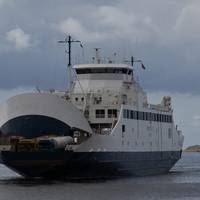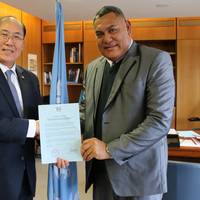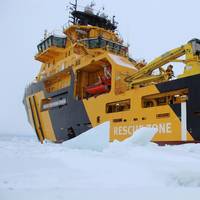
IMO
There are numerous organizations with the abbreviation "IMO," but assuming you are referring to the International Maritime Organization (IMO), here's a detailed overview:
International Maritime Organization (IMO)
The International Maritime Organization, often abbreviated as IMO, is a specialized agency of the United Nations responsible for regulating shipping. The IMO was established in 1948 and came into full force in 1959. Its headquarters are located in London, United Kingdom.
Mission and Objectives
The IMO's primary mission is to create a regulatory framework for the shipping industry that is fair, effective, universally adopted, and universally implemented. The organization focuses on several key objectives:
- Safety and Security: Establishing international safety regulations to ensure the security of life at sea.
- Environmental Protection: Setting standards to minimize the environmental impact of shipping activities.
- Legal Matters: Developing international maritime law to ensure efficient and equitable shipping practices.
- Technical Cooperation: Providing technical assistance and capacity-building programs, especially for developing countries.
- Efficiency and Facilitation: Streamlining procedures for international shipping to make maritime transport more efficient and cost-effective.
Key Conventions and Regulations
The IMO is known for several important international treaties and conventions, such as:
- SOLAS (Safety of Life at Sea): One of the most important treaties focusing on ship safety.
- MARPOL (Marine Pollution): International regulations aimed at preventing pollution from ships.
- COLREGs (Collision Regulations): Regulations for preventing collisions at sea.
- STCW (Standards of Training, Certification, and Watchkeeping for Seafarers): Setting qualification standards for seafarers.
- IMDG Code (International Maritime Dangerous Goods Code): Regulations for the safe transport of hazardous materials and dangerous goods.
Structure and Governance
The IMO consists of an Assembly, a Council, and five main Committees:
- Assembly: The highest governing body, composed of all Member States, which meets every two years.
- Council: Acts as the executive organ and is responsible for ensuring the functioning of the IMO.
- Committees:
- Maritime Safety Committee (MSC)
- Marine Environment Protection Committee (MEPC)
- Legal Committee
- Technical Cooperation Committee
- Facilitation Committee
Membership
The IMO has a wide membership, with around 174 Member States and three Associate Members as of 2023. These members are primarily countries with maritime interests.
Achievements and Impact
The IMO has made significant contributions to maritime safety and environmental protection:
- Reduction in Maritime Accidents: Implementation of rigorous safety standards has led to a marked decrease in maritime accidents.
- Mitigating Environmental Impact: Introduction of cleaner fuel regulations and restrictions on emissions has reduced the environmental impact of the maritime industry.
- Global Standards: The establishment of universally recognized standards has leveled the playing field, fostering fair competition and consistency across the global maritime industry.
If you meant another organization by "IMO company," please provide more context, and I’d be happy to share information accordingly.
- Phone: + 44 (0)20 7735 7611
- Web: https://www.imo.org/
IMO News
Europe Cheers IMO Efforts on CO2 Reduction of Shipping
European shipowners welcome the significant progress made this week at the 69th session of the IMO Marine Environment Protection Committee (MEPC). The basic features…
Repower Brings Ferry into IMO Tier III Compliance

Norwegian ferry Bastø Fosen I is the first vessel commissioned with a globally certified International Maritime Organization (IMO) Tier III compliant marine engine that does not need urea based after treatment. The completely refurbished and repowered Bastø Fosen I has been equipped with GE’s Marine Solutions 16V250MDC, a 16 cylinder 250 mm bore marine diesel engine that is certified to meet both IMO Tier III and EPA Tier 4 emission standards…
IMO Seeks Hosts for Maritime Technology Centers
An ambitious project to help mitigate the harmful effects of climate change has been kick-started by IMO with a call for formal expressions of interest to host centres…
SSI Urges IMO to Tackle GHG Emissions from Shipping
The Sustainable Shipping Initiative (SSI) has called on the International Maritime Organisation (IMO) to show its true intent to reduce Greenhouse Gas emissions…
Fiji Accedes to Six IMO Environmental Treaties

Fiji has acceded to six IMO treaties, including important conventions covering ballast water management and the control of harmful anti-fouling systems on ships. This brings the number of States party to the Ballast Water Management Convention to 49, with the aggregate remaining at 34.82 percent of the world's merchant fleet tonnage (based on global tonnage data as at end-February 2016). Jitoko Tikolevu…
IMO Extends ECDIS Transition Period

The IMO subcommittee on Navigation, Communications and Search and Rescue (NCSR) has extended the transition period for software updates to existing ECDIS for one year to August 31, 2017. The NCSR accepted the IHO’s proposal to give all ship owners using ECDIS more time to be able to obtain the correct software updates to the new IHO -52 presentation library and thus ensure compliance with the guidelines on Maintenance of ECDIS software contained in IMO MSC 1.circ 1503.
First Vessel Secures IMO Polar Code Compliance

AHTS Magne Viking, owned by Viking Supply Ships, is in compliance with the new IMO Polar Code, confirms DNV GL and the Danish Maritime Authority following a successful survey. “Having followed the development of the Polar Code for some years, it is a great achievement to finally survey the first vessel to comply with the Code,” said Morten Mejlænder-Larsen, responsible for Arctic and Polar activities at DNV GL - Maritime.
IMO Revises Guidelines for AIS Use
The International Maritime Organization (IMO) has published revised guidelines for onboard operational use of shipborne automatic identification systems (AIS), as Resolution A.1106(29).
IMO Head to Address Interferry Conference

Korea’s Kitack Lim, whose term as IMO secretary-general began January 1, will address the opening conference session on October 17, following an invitation inspired by 10 years of IMO and Interferry cooperation to improve domestic ferry safety in developing nations. The campaign has recently focused on Southeast Asia, where an estimated 10,000 have died in domestic ferry incidents since the year 2000.
Lyden-Kluss, RADM Thomas Appointed IMO Ambassadors
Carleen Lyden-Kluss, Chief Executive Officer of Morgan Marketing & Communications, along with RADM Cari B. Thomas of the United States Coast Guard were recently…
IMO Confirms No-Go Yet for BWM Convention
Criteria for entry into force of BWM Convention not yet reached – further ratifications needed. Insufficient tonnage to trigger entry into force despite recent ratifications…
EC Funding Gives Green Light to IMO Energy-Efficiency Project
Network of regional maritime technology cooperation centres to be established through €10 million funding contribution. An ambitious IMO project to establish a global…
New IMO Secretary-General Sets Out His Agenda
Kitack Lim of South Korea has issued a message outlining his priorities as incoming Secretary -General of the IMO a post he assumed on January 1 following endorsement…
IMO and WCO Partner on e-Business Compendium
IMO and the World Customs Organization (WCO) have signed a partnership agreement to maintain, update, publish and distribute the IMO Compendium on Facilitation and Electronic Business.
Lim Ki-tack Will Take Office As IMO Chief Next Month
Lim Ki-Tack, who has been elected as the next secretary-general of the International Maritime Organization (IMO) in a ballot, will start his four-year term in the beginning of next year…
IMO Amendments Coming into Force on 1 January
A number of important amendments to IMO treaties enter into force on 1 January 2016, including new requirements for verification of compliance, making audits mandatory…
Full Speed Ahead with Climate-Change Measures at IMO Following Paris Agreement
The International Maritime Organization (IMO) has welcomed the historic achievement of the 2015 Paris Climate Change conference (COP21). IMO has contributed, and will continue to contribute…
IMO Urges Fishing Vessel Treaty Acceptance
The Assembly of the International Maritime Organization (IMO) has called on its Member States to accept a 2012 international fishing vessel safety agreement, in…
IMO Sets Guidelines for 2016-17
The IMO has just closed its Assembly meeting in London, which is held every second year. A number of important items were on the agenda, including the IMO work programme…
EU Needs IMO Leadership to Reduce Shipping Emissions
The European Community Shipowners’ Association (ECSA) has reiterated their support for International Maritime Organisation (IMO) as the proper leader of efforts…




